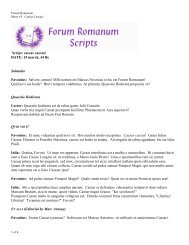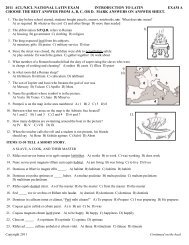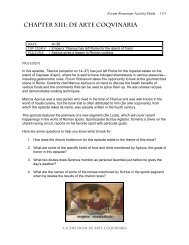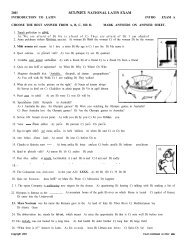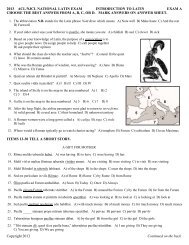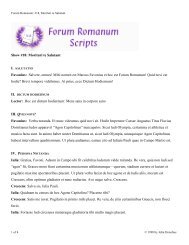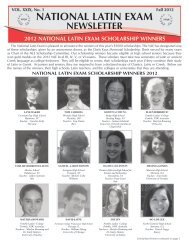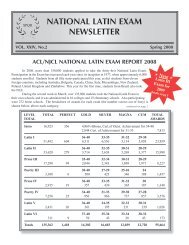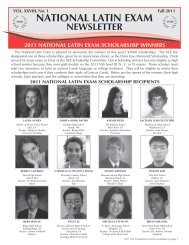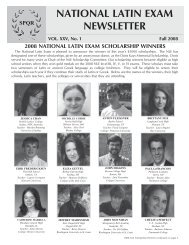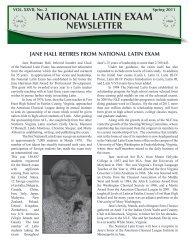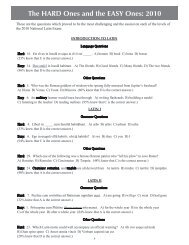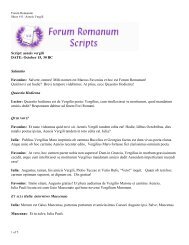2009 acl/njcl national latin exam introduction to latin intro exam a ...
2009 acl/njcl national latin exam introduction to latin intro exam a ...
2009 acl/njcl national latin exam introduction to latin intro exam a ...
You also want an ePaper? Increase the reach of your titles
YUMPU automatically turns print PDFs into web optimized ePapers that Google loves.
26. Which body of water lies between Italy and Greece? A) Baltic Sea B) Adriatic Sea C) Atlantic Ocean<br />
D) Black Sea<br />
27. What might a judge say <strong>to</strong> a defendant who says, “But, sir, I didn’t know!” A) Habeas corpus<br />
B) Nolo contendere C) Sine die D) Ignorantia legis neminem excusat<br />
READ THE PASSAGE AND ANSWER THE QUESTIONS.<br />
APOLLO’S REVENGE<br />
Ōlim erat lēgātus Rōmānus nōmine Gāius Verrēs quī erat improbus 1 improbus = wicked<br />
āmēnsque. Hic vir, ab Italiā iter faciēns, ad īnsulam Dēlum vēnit. In 2 āmēns = crazy<br />
hāc īnsulā fuit templum clārissimum Apollinis. Verrēs templum vīsitāvit atque 3<br />
multa et pulchra vīdit, quae dēsīderāvit. Hic igitur statuās pulcherrimās 4<br />
ex hōc templō ūnā nocte remōvit et eās in nāvem posuit. 5<br />
Postrīdiē, fūrtō cognitō, incolae huius īnsulae erant īrātī, sed etiam 6<br />
eī maximē timēbant vītam in īnsulā sine statuīs. “Apollō erit īrātus,” dīxērunt. 7<br />
“Quōmodo nostrās vītās agēmus?” 8<br />
Nāvis autem quae statuās ferēbat vix discesserat cum magna tempestās 9 vix = scarcely<br />
orta est. Nāvis ipsa dēlēta est, sed Verrēs superfuit. Statuae quae in lī<strong>to</strong>re 10 orta est = arose superfuit =<br />
inventae erant in templum ab incolīs repōnēbantur. Mox hic vir improbus ad 11 survived<br />
urbem Rōmam redīvit. Posteā Gāius Verrēs prōcōnsul Siciliae factus est. 12 prōcōnsul = governor<br />
Ibi artēs īnsulae iterum cēpit. 13<br />
Based on Cicero In Verrem II.1<br />
28. What was Verres doing (lines 1-2)? A) painting B) farming C) writing D) travelling<br />
29. The best translation of clārissimum (line 3) is A) famous B) very famous C) more famous D) rather famous<br />
30. Quae (line 4) refers <strong>to</strong> A) the temple B) the island C) beautiful things D) Verres<br />
31. In line 4, hic refers <strong>to</strong> A) Delos B) the statues C) Verres D) Apollo<br />
32. What did Verres do <strong>to</strong> the statues (lines 4-5)? A) buried them B) broke them C) s<strong>to</strong>le them D) painted them<br />
33. The best translation of eās (line 5) is A) it B) them C) some D) his<br />
34. The best translation of fūrtō cognitō (line 6) is A) in order <strong>to</strong> discover the theft B) while discovering the theft<br />
C) after the theft had been discovered D) that they had discovered the theft<br />
35. In line 6, īrātī describes A) Verres B) the statues C) the inhabitants D) Apollo<br />
36. What is the best translation of agēmus (line 8)? A) can we live B) did we live C) had we lived D) will we live<br />
37. In line 9, vix discesserat indicates the A) reluctance of the sailors <strong>to</strong> depart B) lateness of the hour<br />
C) difficulty in moving the statues D) speed with which the s<strong>to</strong>rm arose<br />
38. The best translation of quae in lī<strong>to</strong>re inventae erant (line 10-11) is A) which had been found on the shore<br />
B) which were floating <strong>to</strong> the shore C) which had been carried on<strong>to</strong> the shore D) which they found buried<br />
on the shore<br />
39. In lines 10-11, what happened <strong>to</strong> the statues? A) They were lost at sea B) The inhabitants put them back<br />
C) Verres successfully s<strong>to</strong>le them D) The inhabitants buried them.<br />
40. At the end of the s<strong>to</strong>ry we learn that A) all the statues were broken B) Verres lived <strong>to</strong> steal again<br />
C) Verres was killed D) the inhabitants rebuilt the temple <strong>to</strong> Apollo<br />
Copyright <strong>2009</strong><br />
Copyright <strong>2009</strong>



